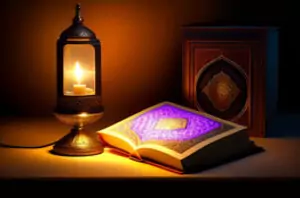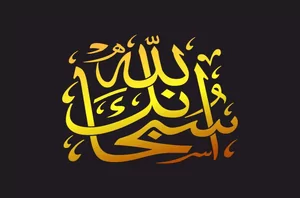Our purpose in this life is to worship the Allah (subḥānahū wa taʿālā); to submit to Him, obey Him and love Him. Dhikr (remembering Allah) is one of the greatest ways to achieve this. The following are some of the many virtues of this noble act from the Qur’ān and Sunnah:
1. Dhikr Is Greater than Everything
Allah (subḥānahū wa ta‘ālā) says, “…And the remembrance of Allah is greater…” (29:45).
2. Frequent Dhikr Leads to Success
Allah (subḥānahū wa ta‘ālā) says, “And remember Allah abundantly, so that you may be successful” (62:10).
3. Dhikr Protects You From Being Amongst the ‘Losers’
Allah (subḥānahū wa ta‘ālā) says, “O you who believe, let not your wealth and your children divert you from the remembrance of Allah. And whoever does that, then those are the losers” (63:9).
4. Dhikr will Save You From Regret
The Messenger of Allah ﷺ said, “No people leave a gathering in which they did not remember Allah, the Almighty, except that it will be as if they are leaving the carcass of a donkey; and it will be a cause of regret for them” (Abū Dāwūd).
He also ﷺ said: “The people of Paradise will not regret anything, except for those moments in which they did not remember Allah” (Ṭabarānī).
ʿAmr b. ʿAbdillāh (raḥimahullāh) said, “On the Day of Judgement, when the veil revealing the rewards of actions is lifted, people will not see any action with greater reward than dhikr. Then, some people will feel regret and say, ‘There was nothing easier for us than doing dhikr.’”
5. Dhikr Is a Protection Against Shaytan
The Messenger of Allah ﷺ quoting Prophet Yaḥyā (ʿalayhis-salām) said, “I command you to remember Allah. Verily, the parable of that is a man who is being chased by his enemies, until he comes to an impenetrable fortress, where he protects himself from them. In the same way, a servant will not protect himself against Shayṭān except by the dhikr of Allah” (Tirmidhī).
Ibn al-Qayyim (raḥimahullāh) explains that dhikr is like a ‘whip’ which restrains and hurts Shayṭān. Every human being has a shayṭān which accompanies him. The ‘shayṭān’ of the believer is weak and frail because it is constantly being beaten by this ‘whip’ (i.e. the believer’s dhikr and obedience of Allah). This is in contrast to the ‘shayṭān’ of the sinner, who rests comfortably, as he is not beaten and whipped by the whip of ‘dhikr’. Thus, his shayṭān is strong and has a stranglehold over him.
6. Dhikr Is the Best Protection From Punishment
The Prophet ﷺ said, “There is nothing better a person can do to save himself from Allah’s punishment than to remember Him” (Bayhaqī).
7. The Reward of One Who Remembers Allah Is That Allah Remembers Him
Allah (subḥānahū wa ta‘ālā) says, “Remember Me, and I will remember you…” (2:152).
The Prophet ﷺ said, “Allah says, ‘I am as My slave thinks of Me, and I am with him when he remembers Me. If he remembers Me within himself, I remember him within Myself; and if he remembers Me in a gathering, I remember him in a better gathering; and if he draws one span nearer to Me, I draw one cubit nearer to him; and if he draws one cubit nearer to Me, I draw a distance of two outstretched arms nearer to him; and if he comes to Me walking, I go to him running’” (Bukhārī).
Ibn al-Qayyim (raḥimahullāh) states that if this was the only virtue of dhikr, it would be sufficient due to its honour and lofty status.
8. Dhikr Is the Best of All Deeds
The Messenger of Allah ﷺ said, “Shall I not inform you of the best of your deeds, the purest of them with your Master, the highest of them in ranks, (a deed which) is better for you than spending gold and silver; and better for you than meeting your enemy and striking their necks, and they strike your necks?” They replied, “Of course.” He ﷺ said, “The remembrance of Allah” (Tirmidhī).
A man asked the Messenger of Allah ﷺ, “Which warriors are the best?” He ﷺ replied, “Those who remember Allah the most.” The man asked, “Which of those who fast are the best?” He ﷺ replied, “Those who remember Allah the most.” Then the man mentioned ṣalāh, zakāh and ḥajj, and each time the Messenger of Allah ﷺ replied, “Those who remember Allah the most.” Abū Bakr (raḍiy Allāhu ʿanhu) said to ʿUmar (raḍiy Allāhu ʿanhu), “Those who remember (Allah) have taken all the good,” at which the Messenger of Allah ﷺ remarked, “Yes, indeed!” (Aḥmad).
The Prophet ﷺ was once travelling with his Companions (radiy Allāhu ʿanhum), and he said to them, “Keep walking, this is Jumdān (a mountain near Makkah). The Mufarridūn have outdone everyone.” They asked, “Who are the Mufarridūn?” He ﷺ replied, “The men and women who frequently remember Allah” (Muslim).
Some of the Companions had raced ahead of others in this physical journey. The Prophet ﷺ took this opportunity to remind them that the real journey is the journey of the heart to its Creator. And that the secret to racing ahead in this journey is abundant dhikr. Thus, the true winners are those who remember Allah the most.
One of the Companions (raḍiy Allāhu ʿanhu) asked, “O Messenger of Allah, the laws of Islam have become many for me, so tell me something which I can cling on to.” He ﷺ replied, “Always keep your tongue moist with the remembrance of Allah” (Tirmidhī).
9. Dhikr Is the Best Reason for a Gathering
The Messenger of Allah ﷺ said, “When a group of people assemble for the remembrance of Allah, the angels surround them, (Allah’s) mercy envelops them, tranquillity descends upon them and Allah mentions them to those who are near Him” (Muslim).
The Messenger of Allah ﷺ said, “When you pass by the meadows of Paradise, then graze well.” They asked, “What are the meadows of Paradise?” He replied, “The circles of dhikr” (Tirmidhī).
The Messenger of Allah ﷺ said, “No group of people sit together to remember Allah, except that when they stand to leave, it is said to them: Stand up! Allah has certainly forgiven your sins and replaced your bad deeds with good ones” (Ṭabarānī).
The Prophet ﷺ said, “Allah will certainly resurrect some people on the Day of Judgement; their faces will be beaming with light, and they will be on pulpits of pearls. People will envy them. They will be neither Prophets nor martyrs.” A bedouin fell to his knees and said, “O Messenger of Allah, disclose to us who they are.” He ﷺ said, “They are those who love each other for the sake of Allah. They are from different tribes and places. They gather together for the remembrance of Allah, and they remember Him” (Ṭabarānī).
10. Dhikr Leads to Allah Boasting About You to the Angels
The Messenger of Allah ﷺ came out to a gathering of his Companions and he asked, “What has made you sit (here)?” They replied, “We are sitting to remember Allah, and to praise Him for guiding us to Islam and blessing us with it.” The Prophet ﷺ asked, “By Allah, is that the only reason?” They replied, “By Allah, we are only sitting for that.” The Prophet ﷺ said, “Indeed, I did not make you swear an oath because I doubted you. Rather, Jibrīl came to me and informed me that Allah the Almighty is boasting about you to the angels” (Muslim).
11. Dhikr Is the Means of Your Duʿas Being Accepted
The Messenger of Allah ﷺ said, “There are three (people) whose supplication Allah does not reject: the one who remembers Allah frequently, the oppressed person, and the just leader” (Ṭabarānī).
12. Dhikr Is the Path to Knowing Allah, Loving Him and Being Loved by Him
Ibn al-Qayyim (raḥimahullāh) said, “Indeed Allah has made a means for attaining everything. He has made continuous remembrance (dhikr) the means for love. So, whoever wants the love of Allah, then let him remember Him abundantly.”
Whoever’s heart and tongue are occupied with dhikr, Allah casts into his heart the light of longing for Him. – Dhū al-Nūn (raḥimahullāh)
Al-Rabīʿ b. Anas (raḥimahullāh) said, “The sign of the love of Allah is that there is a great deal of remembrance of Him, because if you ever love a thing, you remember it a great deal.”
In regards to dhikr, people are on one of two levels. For the general Muslims, it is to earn rewards. For the elite, however, it is to draw near to Allah and be in His presence. What a tremendous gulf there is between the two levels. What a difference there is between one who takes his reward from behind a veil, and one who is drawn close and becomes of the elite lovers! – Ibn Juzayy (raḥimahullāh)
13. Dhikr Is a Source of Nur
Allah (subḥānahū wa ta‘ālā) says, “On that Day you will see believing men and women with their light shining ahead of them and on their right. (They will be told,) ‘Today you have good news of Gardens, under which rivers flow, ( for you) to stay in forever. This is the ultimate triumph’” (57:12).
Dhikr will be a nūr (light) for you in your grave, and on the Day of Judgement. This nūr will keep you steady on the ṣirāṭ (a bridge which must be passed on the Day of Judgement) that will guide you to Paradise.
Dhikr is also nūr in this world. It illuminates your heart, face and the rest of your body. Ibn al-Qayyim (raḥimahullāh) explains that the more nūr the heart has, the greater the nūr of your actions and words will be. Thus, there are some believers whose actions ascend up to Allah, and the nūr of their deeds is like the light of the sun.
14. Dhikr Is the Essence of All Good Deeds
The essence and purpose of good deeds in Islam is the remembrance of Allah. Allah instructed Mūsā (ʿalayhis-salām), “And establish prayer for My remembrance” (20:14). Dhikr is a permanent feature of many good deeds e.g. ṣalāh, ḥajj and fasting. It is the soul of all righteous deeds. When a deed is devoid of the remembrance of Allah, it is like a body with no soul.
15. Dhikr Has No Limits
ʿĀ’ishah (raḍiy Allāhu ʿanhā) said, “The Messenger of Allah ﷺ used to remember Allah at all times” (Muslim).
In the Qur’ān, Allah commands us to perform dhikr after the completion of various deeds (e.g. ṣalāh, ḥajj, jumuʿah, fighting in His path). The deeper meaning of this command is that whilst other actions may come to an end, the remembrance of Allah continues for the believers in this life and the hereafter.
Allah commanded him to exert effort in duʿā’ and worship after finishing from the battlefield. All actions come to an end. However, the remembrance of Allah has no end. All actions come to an end with the ending of this life and nothing of it remains in the hereafter. As for the remembrance of Allah, it endures into the hereafter. The believer lives upon the remembrance of Allah, dies upon it and will be resurrected upon it. – Ḥasan al-Baṣrī (raḥimahullāh)
Dhikr is the only worship that will be performed by the inhabitants of Paradise; and will be the manner in which they ask from Allah (subḥānahū wa ta‘ālā). Allah says, “Their call therein will be: ‘How Perfect You are, O Allah’ and their greeting therein will be: ‘Peace’ and the end of their call will be: ‘Praise be to Allah, the Lord of all the worlds’” (10:10).
The Messenger of Allah ﷺ also said, “The inhabitants of Paradise… will praise and glorify Allah as easily as you breathe” (Muslim).
By Allah, if you could hear the sound of the pens of the angels writing your name amongst those who remember Allah, you would die out of joy. – Ibn al-Qayyim (raḥimahullāh)







